 A Hindu holy man walks past a line of people after voting at a polling station on Monday, May 12, in Varanasi, India, during the ninth and final phase of elections. Voters will elect 543 members to the lower house of Parliament, which will then select the country's next prime minister. Prime Minister Manmohan Singh is stepping down after a decade in charge.
A Hindu holy man walks past a line of people after voting at a polling station on Monday, May 12, in Varanasi, India, during the ninth and final phase of elections. Voters will elect 543 members to the lower house of Parliament, which will then select the country's next prime minister. Prime Minister Manmohan Singh is stepping down after a decade in charge.  Election workers prepare to seal an electronic voting machine after the final polls closed on May 12 in Varanasi.
Election workers prepare to seal an electronic voting machine after the final polls closed on May 12 in Varanasi.  The Indian National Congress party's Rahul Gandhi, center, waves to supporters at a rally in Varanasi on Saturday, May 10, the final day of campaigning in India's national election. There are 814 million eligible voters in India, making this the largest election in world history.
The Indian National Congress party's Rahul Gandhi, center, waves to supporters at a rally in Varanasi on Saturday, May 10, the final day of campaigning in India's national election. There are 814 million eligible voters in India, making this the largest election in world history.  A family on a motorcycle passes Indian National Congress supporters in Varanasi on May 10.
A family on a motorcycle passes Indian National Congress supporters in Varanasi on May 10.  Former TV journalist Ashutosh and actor Jaaved Jaffrey, who are Aam Aadmi Party parliamentary candidates, help campaign for party leader Arvind Kejriwal in Varanasi. Kejriwal established the party in response to the anti-corruption protests in 2011-12, and the party had a surprise showing in the 2013 local elections for the Delhi Assembly.
Former TV journalist Ashutosh and actor Jaaved Jaffrey, who are Aam Aadmi Party parliamentary candidates, help campaign for party leader Arvind Kejriwal in Varanasi. Kejriwal established the party in response to the anti-corruption protests in 2011-12, and the party had a surprise showing in the 2013 local elections for the Delhi Assembly.  Trinamool Congress Chairwoman Mamata Banerjee, with microphone, campaigns for Jadavpur TMC candidate Sugata Bose, left, and South Kolkata candidate Subrata Bakshi, center, with Mithun Chakraborty on May 10 in Kolkata.
Trinamool Congress Chairwoman Mamata Banerjee, with microphone, campaigns for Jadavpur TMC candidate Sugata Bose, left, and South Kolkata candidate Subrata Bakshi, center, with Mithun Chakraborty on May 10 in Kolkata.  Election workers in Leh check voting machines on Tuesday, May 6.
Election workers in Leh check voting machines on Tuesday, May 6.  Election officers rest between parked trucks before proceeding to their polling stations May 6 in Allahabad, India.
Election officers rest between parked trucks before proceeding to their polling stations May 6 in Allahabad, India. 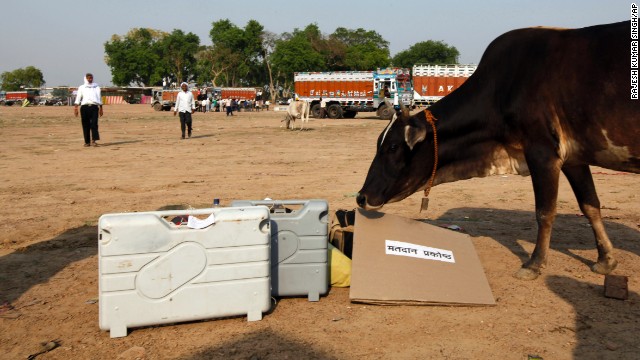 A cow approaches electronic voting machines in Allahabad on May 6.
A cow approaches electronic voting machines in Allahabad on May 6.  Supporters of the Communist Party of India (Marxist) walk with party flags during an election campaign in Kolkata on Sunday, May 4.
Supporters of the Communist Party of India (Marxist) walk with party flags during an election campaign in Kolkata on Sunday, May 4.  Women and children attend an election rally in Amethi, India, on Saturday, May 3.
Women and children attend an election rally in Amethi, India, on Saturday, May 3. 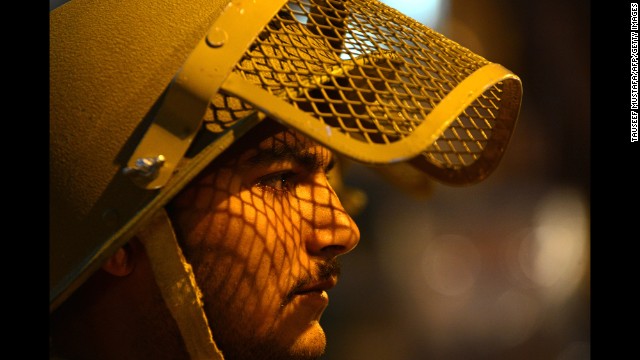 A police officer patrols during curfew in the Maisuma locality of Srinagar, India, on Friday, May 2.
A police officer patrols during curfew in the Maisuma locality of Srinagar, India, on Friday, May 2.  A Kashmiri Muslim woman confronts Indian police after they arrested a youth during a protest in Srinagar on May 2.
A Kashmiri Muslim woman confronts Indian police after they arrested a youth during a protest in Srinagar on May 2.  An Indian soldier stands in the middle of an empty Srinagar street Wednesday, April 30, following calls by rebels and separatist politicians to boycott the parliamentary elections.
An Indian soldier stands in the middle of an empty Srinagar street Wednesday, April 30, following calls by rebels and separatist politicians to boycott the parliamentary elections.  A soldier helps voters locate their polling station in the village of Sultanwind, near Amritsar, India, on April 30.
A soldier helps voters locate their polling station in the village of Sultanwind, near Amritsar, India, on April 30.  Election officials distribute electronic voting machines and other material to polling officials in Howrah, India, on Tuesday, April 29.
Election officials distribute electronic voting machines and other material to polling officials in Howrah, India, on Tuesday, April 29.  Police conduct a security check Monday, April 28, before voting in Srinagar.
Police conduct a security check Monday, April 28, before voting in Srinagar.  A supporter listens to Bahujan Samaj Party leader Mayawati during an election rally in Allahabad on Sunday, April 27.
A supporter listens to Bahujan Samaj Party leader Mayawati during an election rally in Allahabad on Sunday, April 27.  Kashmiri Muslims watch from a window as an Indian paramilitary soldier stands guard near the site of an explosion near the venue where an election campaign rally was to take place in downtown Srinagar on April 27.
Kashmiri Muslims watch from a window as an Indian paramilitary soldier stands guard near the site of an explosion near the venue where an election campaign rally was to take place in downtown Srinagar on April 27. 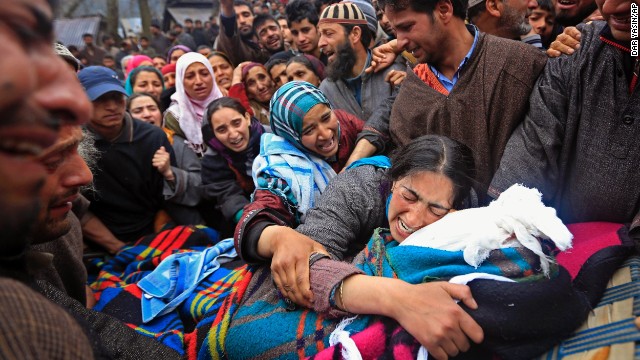 Sumaira Wani, wife of Zia-Ul-Haq, mourns by the body of her husband during his funeral in Hirpora, some 65 kilometers (40 miles) north of Srinagar on Friday, April 25. Zia, an Indian poll official, was killed soon after voting in the ongoing election, when suspected rebels fatally shot him and wounded four others in an attack on a bus in the Indian-controlled portion of Kashmir.
Sumaira Wani, wife of Zia-Ul-Haq, mourns by the body of her husband during his funeral in Hirpora, some 65 kilometers (40 miles) north of Srinagar on Friday, April 25. Zia, an Indian poll official, was killed soon after voting in the ongoing election, when suspected rebels fatally shot him and wounded four others in an attack on a bus in the Indian-controlled portion of Kashmir. 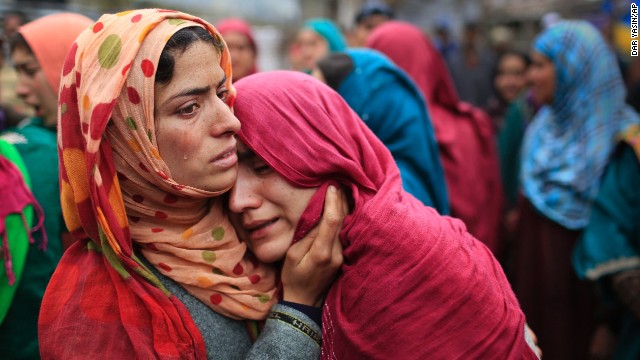 Unidentified relatives cry during the funeral procession of Zia-Ul-Haq in Hirpora on April 25.
Unidentified relatives cry during the funeral procession of Zia-Ul-Haq in Hirpora on April 25.  An Indian Punjab State Police officer stands in front of a picture of Bharatiya Janata Party leader Narendra Modi and Punjab Chief Minister Parkash Singh Badal during an election rally by the two men April 25 in Bathinda, India.
An Indian Punjab State Police officer stands in front of a picture of Bharatiya Janata Party leader Narendra Modi and Punjab Chief Minister Parkash Singh Badal during an election rally by the two men April 25 in Bathinda, India.  Indian women cast their vote at a village near Sawai Madhopur, India, on Thursday, April 24.
Indian women cast their vote at a village near Sawai Madhopur, India, on Thursday, April 24.  An Indian woman gives her thumb impression before casting her vote in a village near Sawai Madhopur on April 24.
An Indian woman gives her thumb impression before casting her vote in a village near Sawai Madhopur on April 24.  A polling official carries electronic voting machines at a distribution center in Gauhati, India, on Wednesday, April 23.
A polling official carries electronic voting machines at a distribution center in Gauhati, India, on Wednesday, April 23.  A woman casts her vote on the outskirts of Jaipur, India, on Thursday, April 17.
A woman casts her vote on the outskirts of Jaipur, India, on Thursday, April 17.  An elderly man casts his vote inside a polling station in Amroha, India, on April 17.
An elderly man casts his vote inside a polling station in Amroha, India, on April 17.  A supporter of the Peoples Democratic Party shouts slogans during an election campaign rally on the outskirts of Srinagar on April 17. Several separatist organizations have jointly appealed to the people of Jammu and Kashmir to boycott the Indian parliamentary elections.
A supporter of the Peoples Democratic Party shouts slogans during an election campaign rally on the outskirts of Srinagar on April 17. Several separatist organizations have jointly appealed to the people of Jammu and Kashmir to boycott the Indian parliamentary elections.  A helicopter carrying Nagma, a Bollywood actress and Congress Party candidate from Meerut, takes off after an election rally on April 17.
A helicopter carrying Nagma, a Bollywood actress and Congress Party candidate from Meerut, takes off after an election rally on April 17. 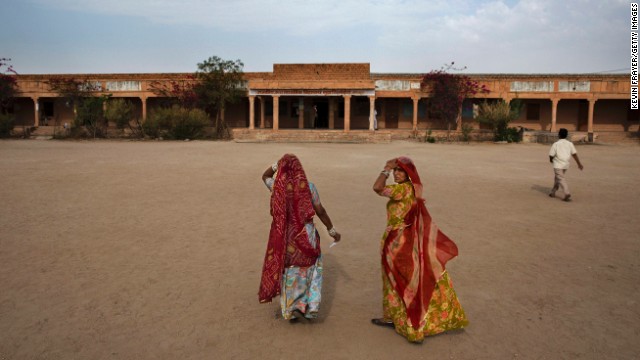 Women arrive to vote at a polling station on April 17, in the desert state of Rajasthan.
Women arrive to vote at a polling station on April 17, in the desert state of Rajasthan.  People stand in line to cast their votes in Jaipur on April 17.
People stand in line to cast their votes in Jaipur on April 17.  A voter casts her ballot at a polling booth in Doda, India, on April 17.
A voter casts her ballot at a polling booth in Doda, India, on April 17.  An Indian election official marks the finger of a voter with ink before she casts her ballot in Sambhar, India, on April 17.
An Indian election official marks the finger of a voter with ink before she casts her ballot in Sambhar, India, on April 17. 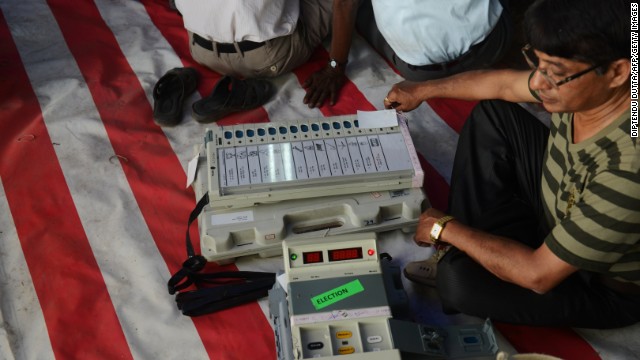 An election official checks an electronic voting machine before taking it to polling stations at a distribution center in Siliguri, India, on Wednesday, April 16.
An election official checks an electronic voting machine before taking it to polling stations at a distribution center in Siliguri, India, on Wednesday, April 16.  An election official carries an electronic voting machine across a makeshift bridge after picking it up from a distribution center in Doda on April 16.
An election official carries an electronic voting machine across a makeshift bridge after picking it up from a distribution center in Doda on April 16. 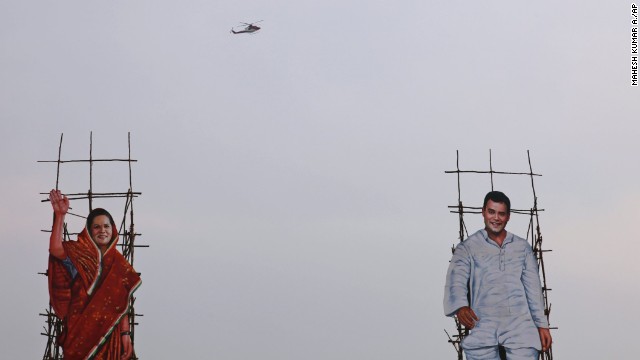 Portraits of Congress Party President Sonia Gandhi, left, and Vice President Rahul Gandhi are seen at an election rally in Karimnagar, India, on April 16.
Portraits of Congress Party President Sonia Gandhi, left, and Vice President Rahul Gandhi are seen at an election rally in Karimnagar, India, on April 16.  Security personnel load their luggage on a bus as they leave for various polling centers in Udhampur, India, on Tuesday, April 15.
Security personnel load their luggage on a bus as they leave for various polling centers in Udhampur, India, on Tuesday, April 15.  A young girl watches an election campaign rally from her house in Rawalpora, India, on April 15.
A young girl watches an election campaign rally from her house in Rawalpora, India, on April 15.  Supporters of India's main opposition Bharatiya Janata Party dance during a campaign rally in Udhampur on April 15.
Supporters of India's main opposition Bharatiya Janata Party dance during a campaign rally in Udhampur on April 15. 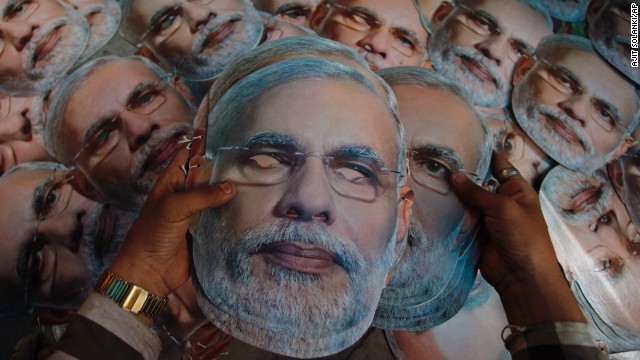 A worker arranges masks of Bharatiya Janata Party candidate Narendra Modi at a printing press in Ahmedabad, India, on Saturday, April 12.
A worker arranges masks of Bharatiya Janata Party candidate Narendra Modi at a printing press in Ahmedabad, India, on Saturday, April 12.  A woman carries her child and waits for her identity to be checked before voting in Diphu, India, on April 12.
A woman carries her child and waits for her identity to be checked before voting in Diphu, India, on April 12. 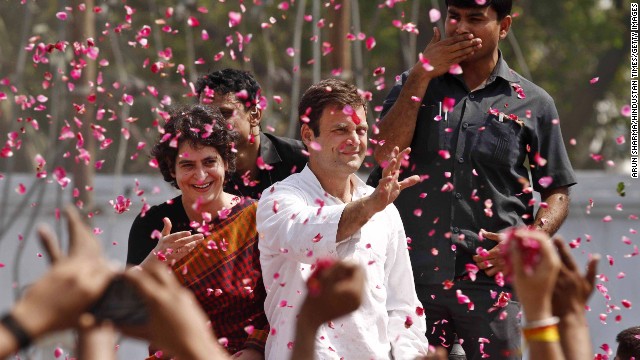 Rahul Gandhi, one of the leading candidates for prime minister, waves to supporters in Amethi, India, as he arrives to file his nomination on April 12.
Rahul Gandhi, one of the leading candidates for prime minister, waves to supporters in Amethi, India, as he arrives to file his nomination on April 12.  Congress Party supporters hold flags as they walk home from a Gandhi rally April 12 in the northern state of Uttar Pradesh.
Congress Party supporters hold flags as they walk home from a Gandhi rally April 12 in the northern state of Uttar Pradesh.  Gaurav Shrinivas Sharma, a climber nicknamed Indian Spiderman, campaigns in Mumbai, India, on Friday, April 11. Sharma is an independent candidate from the South Mumbai constituency.
Gaurav Shrinivas Sharma, a climber nicknamed Indian Spiderman, campaigns in Mumbai, India, on Friday, April 11. Sharma is an independent candidate from the South Mumbai constituency.  People in Doda wave as a helicopter carrying Gandhi leaves after a campaign rally on April 11.
People in Doda wave as a helicopter carrying Gandhi leaves after a campaign rally on April 11.  Indian Muslims wait outside a polling booth to cast their votes on Thursday, April 10.
Indian Muslims wait outside a polling booth to cast their votes on Thursday, April 10.  A paramilitary soldier stands guard inside a room containing ballot boxes on April 10.
A paramilitary soldier stands guard inside a room containing ballot boxes on April 10.  A woman casts her vote in Muzaffarnagar, India, on April 10.
A woman casts her vote in Muzaffarnagar, India, on April 10.  Voters wait for their identities to be verified before casting their ballots April 10 in Haryana, India.
Voters wait for their identities to be verified before casting their ballots April 10 in Haryana, India.  A woman points out her photo before casting her vote in New Delhi on April 10.
A woman points out her photo before casting her vote in New Delhi on April 10.  Jyoti Amge, a first-time voter and the world's shortest woman according to Guinness World Records, gets her finger marked with ink after voting in Nagpur, India, on April 10.
Jyoti Amge, a first-time voter and the world's shortest woman according to Guinness World Records, gets her finger marked with ink after voting in Nagpur, India, on April 10.  A woman is given directions by a polling station officer in Haryana on April 10.
A woman is given directions by a polling station officer in Haryana on April 10.  Voters leave a polling station in Muzaffarnagar on April 10.
Voters leave a polling station in Muzaffarnagar on April 10.  A polling officer checks the number of an electronic voting machine after it was deposited in Senapati, India, on Wednesday, April 9.
A polling officer checks the number of an electronic voting machine after it was deposited in Senapati, India, on Wednesday, April 9.  A polling official marks a voter's finger with ink in Senapati on April 9.
A polling official marks a voter's finger with ink in Senapati on April 9.  An elderly man casts his vote in Manipur, India, on April 9.
An elderly man casts his vote in Manipur, India, on April 9. 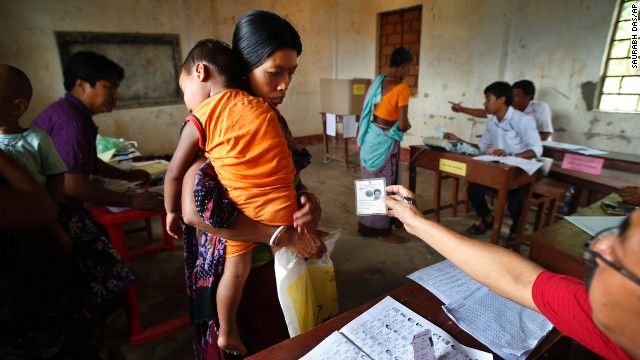 An official checks a voter's identity card in Agartala, India, on Monday, April 7.
An official checks a voter's identity card in Agartala, India, on Monday, April 7.  People wait in lines to cast their votes in Agartala on April 7.
People wait in lines to cast their votes in Agartala on April 7.  An election official checks the identity of a voter on April 7.
An election official checks the identity of a voter on April 7.  A woman with a baby casts her vote inside a polling center at Misamora Sapori, an island in the Brahmaputra River, on April 7.
A woman with a baby casts her vote inside a polling center at Misamora Sapori, an island in the Brahmaputra River, on April 7.  Rahul Gandhi addresses supporters during an election rally in Bangalore, India, on April 7. Gandhi's great-grandfather, grandmother and father have all served as prime minister.
Rahul Gandhi addresses supporters during an election rally in Bangalore, India, on April 7. Gandhi's great-grandfather, grandmother and father have all served as prime minister.  Running against Gandhi is Narendra Modi, chief minister of the western state of Gujarat with a reputation as a tough, "can-do" administrator.
Running against Gandhi is Narendra Modi, chief minister of the western state of Gujarat with a reputation as a tough, "can-do" administrator. 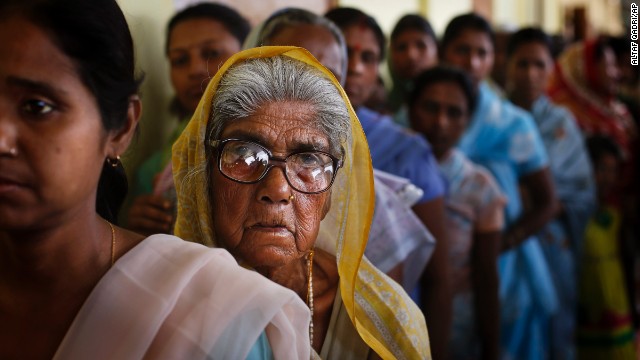 Indians in Dibrugarh stand in a line to cast their vote on April 7.
Indians in Dibrugarh stand in a line to cast their vote on April 7. 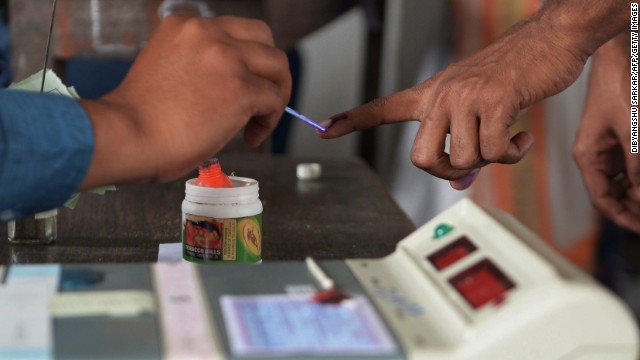 An election officer uses ink to mark a voter's finger at a polling station in Dibrugarh on April 7.
An election officer uses ink to mark a voter's finger at a polling station in Dibrugarh on April 7.  A polling officer in Agartala looks for a voter's name in the registered voter list April 7.
A polling officer in Agartala looks for a voter's name in the registered voter list April 7.  A polling official in Dibrugarh tests an electronic voting machine prior to the start of voting April 7.
A polling official in Dibrugarh tests an electronic voting machine prior to the start of voting April 7.  People wait in line to cast their votes during the first phase of voting in Dibrugarh.
People wait in line to cast their votes during the first phase of voting in Dibrugarh.  Women voters wait outside a polling station in Dibrugarh on April 7.
Women voters wait outside a polling station in Dibrugarh on April 7.
- Ravi Agrawal: India's business culture could profit from being more like China's
- He says many in India hope winner of the election will introduce more efficiency
- While new leadership can focus on economy, it's not so easy to reshape a nation, he says
- Agrawal: For real change, the impetus has to come up from the bottom up
Editor's note: Ravi Agrawal is CNN's New Delhi Bureau chief and was formerly senior producer of the network's "Fareed Zakaria GPS." Follow him on Twitter: @RaviAgrawalCNN
Hong Kong (CNN) -- I met an entrepreneur recently who was comparing doing business in Asia's two biggest countries. "When I'm in India," he said, "I spend the first 40 minutes of any meeting exchanging niceties. In the last five minutes, we get to business." What about China? "We do business for 40 minutes. Right at the end, we chit-chat for five."
It's only an anecdote, but the results seem to bear it out. China gets things done; India invents ways not to. China dazzles the world by hosting an impeccable Olympics; India struggles to complete basic infrastructure for the Commonwealth Games.
Perhaps that's why it's fascinating to watch the rise of India's Narendra Modi, the man many believe will be India's next Prime Minister. Modi's sales pitch is simple: he gets things done. For Indians, it's a seductive notion: Can India be like China?
There is no doubt that India has room to improve. Consider productivity: India's ranks 60th in the world on the World Economic Forum's ranking of countries by competitiveness (China is 29th). Or consider ease of doing business: the World Bank ranks India 134th in the world. If you want to start a business, the World Bank says India ranks 179th in the world -- in other words, go ahead and explore opportunities in 178 other countries before you settle on India. It's as good as putting a "closed" sign on the shop door.
For businesses in India and beyond, Modi represents an end to red tape. India's financial markets are salivating at the prospect of his leadership -- stocks are up 20% since his candidacy was announced last September.
If you speak to voters in his home state of Gujarat -- which has flourished with Chinese levels of growth under his leadership in the last decade -- Modi represents the joys of getting rich. Sounds familiar? That's because it evokes Deng Xiaoping, the Chinese premier who kick-started national reforms and an unprecedented period of growth.
It's not just Deng. Modi has been compared to a number of world leaders. Some say he would be like Lee Kuan Yew, Singapore's visionary leader. (Note that implicit in these comparisons is the understanding that Modi could tend toward being authoritarian).
Others say the best person to compare Modi to is U.S. President Ronald Reagan -- because both were outsiders resented by traditional elites. Still others insist the best analogy is former British PM Margaret Thatcher, because of their shared appetite for privatization and small government.
Modi could be any -- or none -- of those leaders. The truth is we just don't know; we don't have enough information about his track record, and how it could translate across India. But the larger point is that this is not just about Modi, it's about India.
 Hinduja calls for Modi majority in India
Hinduja calls for Modi majority in India  Inflation a concern for Indian voters
Inflation a concern for Indian voters 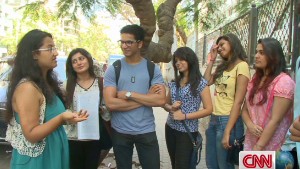 Meet India's first time voters
Meet India's first time voters The Carnegie Endowment's Milan Vaishnav rightly points out that even the most reform-minded prime minister would face many hurdles. Among them, Vaishnav cites a J.P. Morgan study of 50 of the central government's stalled investment projects: 40 of them fell through because of state, and not central, red tape. Constitutionally, there's little a prime minister can do about that, no matter how reform-minded.
Let me use another anecdote to explain the task ahead for the world's biggest democracy. Indians are infamous for being unpunctual. So, one wonders, is that genetic? Are Indians inherently prone to being late to meetings? The answer is no. Take an Indian who is unpunctual, and place him in New York -- he'll likely be on time for every meeting he schedules.
Similarly, a New Yorker would likely become unpunctual in New Delhi. The reason is that punctuality is based on economic incentive -- if everyone is always on time, then it makes sense to make an effort to be on time. It follows then, punctuality is based on inertia. If everyone's doing it, it's in your best interest to follow suit.
In a free democracy like India, progress is based on inertia, too. Everyone needs to push at the same time. Indians can dream to have cities like Singapore, Hong Kong or Beijing. But to do so they will need more than just one reform-minded leader. They will need change from the bottom up.
For better or worse, such is the nature of India's secular, constitutional democracy. India can certainly learn from China. But to do that, it doesn't have to become China. In the next few weeks and months, that is the issue Indians will be debating.
Follow @CNNOpinion on Twitter.
Join us on Facebook/CNNOpinion.







